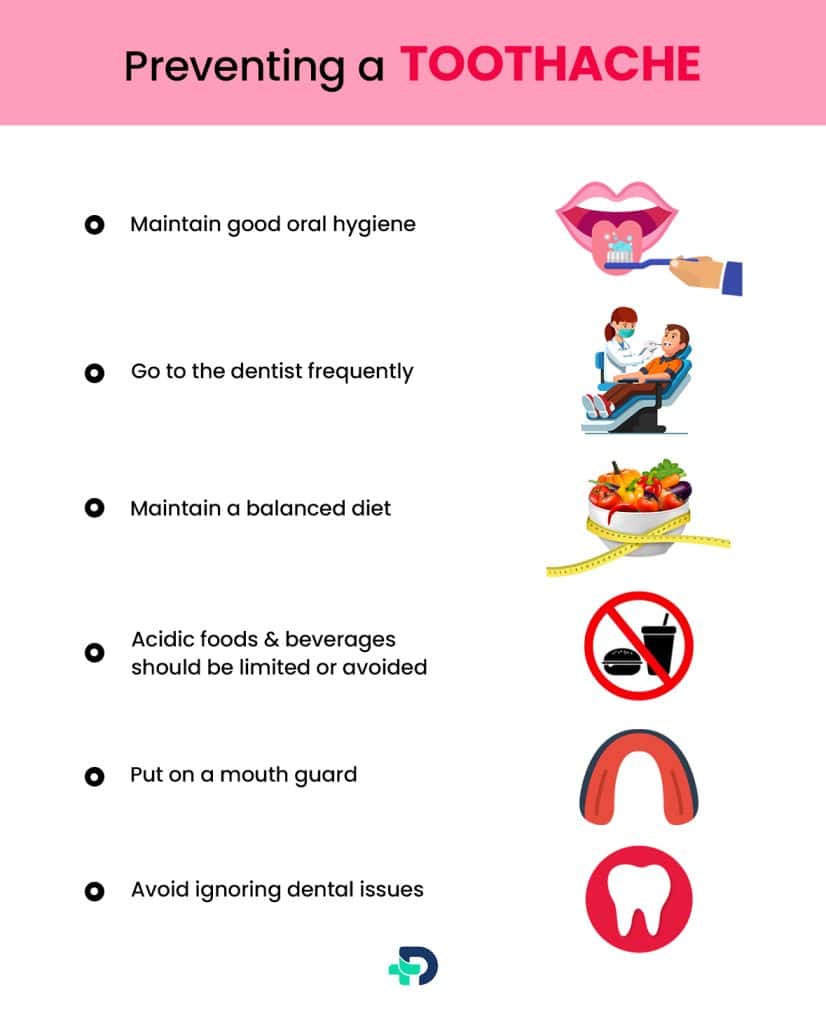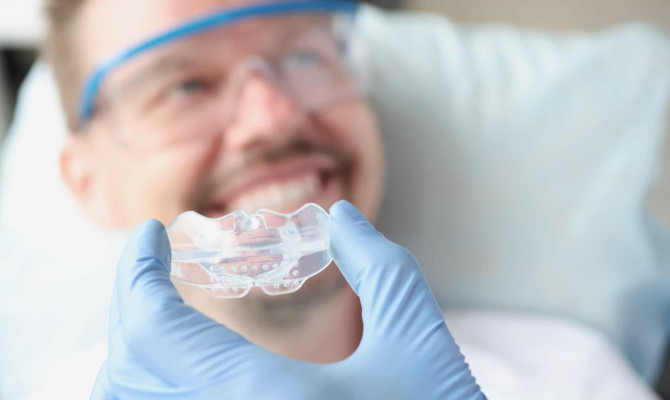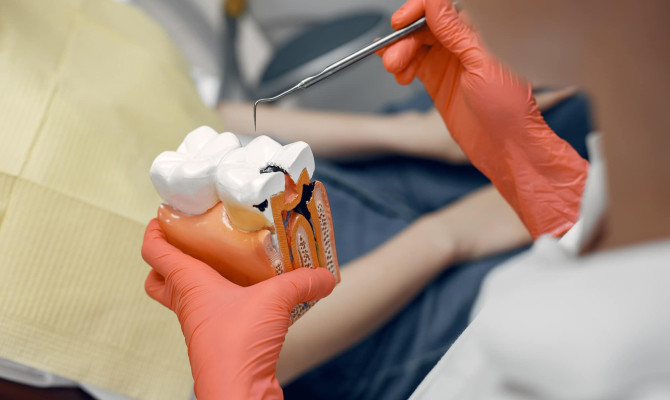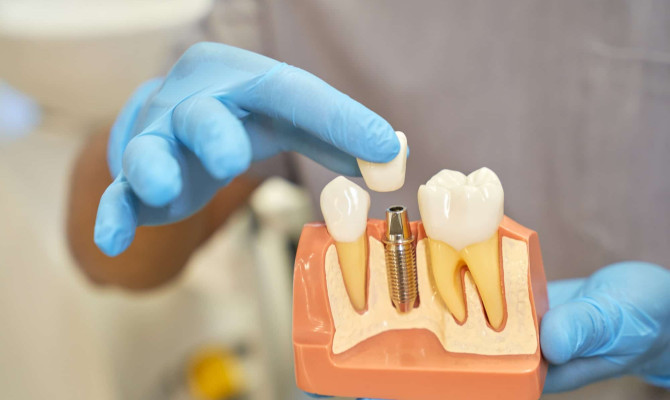Understanding a Toothache: Causes, Treatment and Prevention

- Toothache
- 17 Aug 2023
Overview
Overview
People of all ages are susceptible to toothaches, common dental conditions that cause pain and discomfort. Most people have dealt with this condition at some point, which can seriously interfere with daily life.
We will dive into the complexities of toothaches in this article, looking at their sources, symptoms, and potential treatments.

Causes
What are the causes of a Toothache?
The causes of it might range from dental issues to underlying medical conditions. Here are a few examples:
- Tooth decay
- Dental abscess
- Gum disease
- Tooth fracture
- Dental trauma
- Impacted wisdom tooth
- Sinus infections
- Temporomandibular joint disorders
Dental decay
- Tooth decay or dental cavities are one of the leading causes. Cavities develop when plaque, a bacterial film that sticks to teeth, accumulates and interacts with dietary carbohydrates to form acids that dissolve tooth enamel. These fissures may reveal the delicate inner layers, which could be painful.
Tooth abscess
- An abscess in the mouth is a pus-filled pocket caused by a bacterial infection of the gums or teeth. It can happen when gum disease or tooth decay worsens, allowing germs to enter the tooth’s pulp or the tissues around it. The infection brings on inflammation and severe discomfort.5Causes| Researched based study from Aae.org
Gum disease
- Periodontal disease, often known as gum disease, is an infection of the tissues holding the teeth in place. The initial indication is gum inflammation; if untreated, periodontitis can develop. The tooth may become exposed as the gums get diseased and recede, which can cause sensitivity and pain.
Fracture
- A tooth that is broken or cracked can be very painful, significantly if the crack extends into the layers of the tooth that contain the nerves. Trauma, teeth grinding (bruxism), biting on complex objects, or weakened teeth following massive fillings or root canal therapy can all result in fractures.
Trauma
- A sports accident or a fall might produce oral trauma that results in toothache. The impact may displace the tooth, fracture the tooth’s structure, or even knock the tooth out entirely. Trauma can cause severe pain, necessitating immediate dental care.
Wisdom tooth with impaction
- Third molars, or wisdom teeth, frequently lack enough room to erupt correctly, which results in impaction. If partially erupted or lodged under the gum line, impacted teeth can hurt, push, or feel uncomfortable.
Sinus infections
- A toothache occasionally refers to pain from a sinus infection. Because the upper teeth’s roots are close to the sinuses, discomfort in the upper jaw might result from a sinus infection or congestion.
Temporomandibular joint disorders
- Pain resembling a toothache can be brought on by conditions that affect the jaw joint, such as TMJ dysfunction.
- Because the TMJ joins the jawbone to the skull, problems with it, such as misalignment, bruxism, or inflammation, can cause jaw pain that extends to the teeth4Causes| Researched based study from Nhs.uk ,5Causes| Researched based study from Aae.org
Types
Types of Toothache
Different varieties of toothache can appear, each with its traits and underlying causes. Here are a few typical examples:
- Sharp, intense pain
- Throbbing or pulsating pain
- Constant, persistent pain
- Sensitivity to hot or cold
- Pain on chewing or biting
- Radiating pain
- Dull, aching discomfort
Sharp, severe pain
- This is commonly associated when biting down by teeth sensitivity to hot or cold conditions. It may indicate a fractured tooth or dental cavities. The afflicted tooth is often the only place where the pain is felt.
Pulsating or throbbing pain
- This is often characterized by a dull or severe pain that is constant and rhythmic. It frequently indicates a dental abscess or infection. The pain may become painful or spread to the jaw, ear, or neck when lying down.
Constant, persistent pain
- This term is used to describe persistent discomfort that is difficult to manage. It can result from gum disease, an abscess, or extensive tooth decay. Pain levels range from mild to severe.
Sensitivity
- A normal toothache makes drinking or eating hot or cold foods painful or uncomfortable. It can be brought on by tooth decay, exposed tooth roots, gum recession, or enamel erosion.
Radiating pain
- Some toothaches can cause pain to spread to the head, jaw, or other parts of the face. This may happen due to sinus infections, TMJ issues, or irritation of the nerves near the impacted tooth.
- The pain could either be throbbing or continuo depending on the underlying reasons.
Dull, aching discomfort
- This type is frequently chronic and may be a symptom of bruxism, temporomandibular joint problems, or strain in the jaw muscles brought on by stress. The discomfort may range from minor to moderate and last all day.3Types| Researched based study from Clevelandclinic.org
Treatment
How is a Toothache treated?
Examination of the teeth
- A complete dental exam is the first step. To determine the source of discomfort, the dentist will examine the damaged tooth and surrounding tissues and maybe take dental X-rays.
Dental restorations or fillings
- The dentist may need to remove the deteriorated part and place a dental filling if tooth decay or dental cavities are the cause. This supports both pain relief and tooth structural restoration.
Root canal therapy
- If the pulp of the tooth is infected or irritated, root canal therapy may be required. To do the operation, the infected pulp must be removed. The root canal must then be cleaned and filled.
- Root canal therapy both prevents tooth extraction and provides pain relief.
Tooth removal
- Tooth extraction may be necessary if the tooth is significantly decaying, damaged beyond repair, or infected severely.
- The tooth is extracted during the procedure, and the dentist may also go through replacement choices and post-op instructions if necessary.
Antibiotics
- The dentist may recommend different antibiotics to treat a tooth abscess or severe infection to manage the condition and lessen pain and swelling.
- It’s important to finish the prescribed antibiotic course as directed.
Painkiller medications
- Ibuprofen and paracetamol, two over-the-counter medications, can both temporarily reduce pain.
- For proper use, adhere to the usage guidelines and dose suggested on the box or seek medical advice.
Toothpaste for desensitization
- If tooth sensitivity is the root of the problem desensitizing toothpaste with chemicals like fluoride or potassium nitrate can gradually reduce the sensitivity.
Rinse in warm salt water.
- Warm salt water might help reduce swelling and offer momentary comfort for minor toothaches.
- 8 ounces of warm water mixed with 1/2 teaspoon salt should be gargled for 30 seconds before being spit out1Treatment| Researched based study from Nlm.nih.gov ,2Treatment| Researched based study from Nlm.nih.gov
Prevention

Preventing a Toothache
Maintain good oral hygiene.
- Use dental floss or interdental cleaners and brush your teeth with fluoride toothpaste at least twice daily this removes plaque, which can cause gum disease and tooth decay.
Go to the dentist frequently.
- Professional cleanings and regular dental exams are crucial. Dentists can find and treat dental problems before they worsen or become more uncomfortable.
Maintain a balanced diet.
- Consume sugary meals and beverages in moderation, as they can promote tooth decay.
- Choose a healthy, balanced diet rich in calcium-rich foods, fruits, and vegetables for strong teeth.
Acidic foods and beverages should be limited or avoided.
- They may erode tooth enamel, increasing sensitivity and decay risk to your teeth.
- When consuming citrus fruits, fizzy beverages, and acidic condiments, use caution and always rinse your mouth thoroughly.
Put on a mouth guard.
- To protect your teeth from impact, put on a mouth guard. If you engage in contact sports or other activities, you run the risk of suffering dental injuries.
Avoid ignoring dental issues.
- Seek immediate dental care if you have any symptoms of dental problems, such as sensitivity, gum irritation, or poor breath.
- Addressing them can stop the situation from getting worse.
Do not use your teeth as tools.
- Please do not use your teeth to open bottles, tear up packages, or carry out other duties that were not intended.
- By using your teeth in this way, you run the danger of damaging them and developing toothaches6Prevention| Researched based study from Nhsinform.scot
Any feedback on this article?
 This Articles content was accurate
This Articles content was accurate Very Informative Article
Very Informative Article I have a question or a comment
I have a question or a comment
 This article contains inaccurate content
This article contains inaccurate content This article was not helpful
This article was not helpful I have a question or a comment
I have a question or a comment
We appreciate your helpful feedback!
Checkout our social pages
References
-
National Library of Medicine
Managing tooth pain in general practice | Treatment
-
National Library of Medicine
Management of dental pain in primary care | Treatment
-
Cleveland Clinic
Toothache and swelling | Types
-
National Health Service
Toothache | Causes
-
American Association of Endodontists
Tooth Pain | Causes
-
NHS Inform
Toothache | Prevention





































